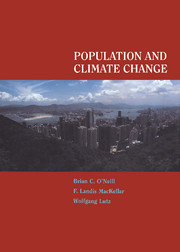Book contents
- Frontmatter
- Contents
- Foreword
- Preface
- Authors and Contributors
- Acknowledgments
- PART I
- 1 Climate Change
- 2 The Human Population
- 3 Population, Economic Development, and Environment
- PART II
- Appendix I Fertility and Mortality Assumptions for IIASA Population Projections
- Appendix II Household-level Economies of Scale in Energy Consumption
- Appendix III Population in Major Climate Change Assessment Models
- References
- Index
1 - Climate Change
Published online by Cambridge University Press: 23 December 2009
- Frontmatter
- Contents
- Foreword
- Preface
- Authors and Contributors
- Acknowledgments
- PART I
- 1 Climate Change
- 2 The Human Population
- 3 Population, Economic Development, and Environment
- PART II
- Appendix I Fertility and Mortality Assumptions for IIASA Population Projections
- Appendix II Household-level Economies of Scale in Energy Consumption
- Appendix III Population in Major Climate Change Assessment Models
- References
- Index
Summary
The threat of human-induced climate change, popularly known as global warming, presents a difficult challenge to society over the coming decades. The production of so-called “greenhouse gases” (GHGs) as a result of human activity, mainly due to the burning of fossil fuels such as coal, oil, and natural gas, is expected to lead to a generalized warming of the Earth's surface, rising sea levels, and changes in precipitation patterns. The potential impacts of these changes are many and varied – more frequent and intense heat waves, changes in the frequency of droughts and floods, increased coastal flooding, and more damaging storm surges – all with attendant consequences for human health, agriculture, economic activity, biodiversity, and ecosystem functioning.
Because the impacts of climate change are expected to be global and potentially severe, and because energy production from fossil fuels is a fundamental component of the world economy, the stakes in the issue are high. At the same time, a number of aspects of climate change complicate the problem. First, while much is known about the factors governing climate, considerable uncertainty remains in projections of how much climate will change, how severe the impacts will be, and how costly it would be to reduce GHG emissions. Second, because the impacts of today's GHG emissions will be felt for decades into the future, it is not possible to wait and see how severe impacts will turn out to be before taking preventive action. Therefore, if emissions are reduced now, the costs will be borne in the near term while the benefits, which will depend on uncertain projections of future impacts, will be realized largely in the long term.
- Type
- Chapter
- Information
- Population and Climate Change , pp. 3 - 38Publisher: Cambridge University PressPrint publication year: 2000



